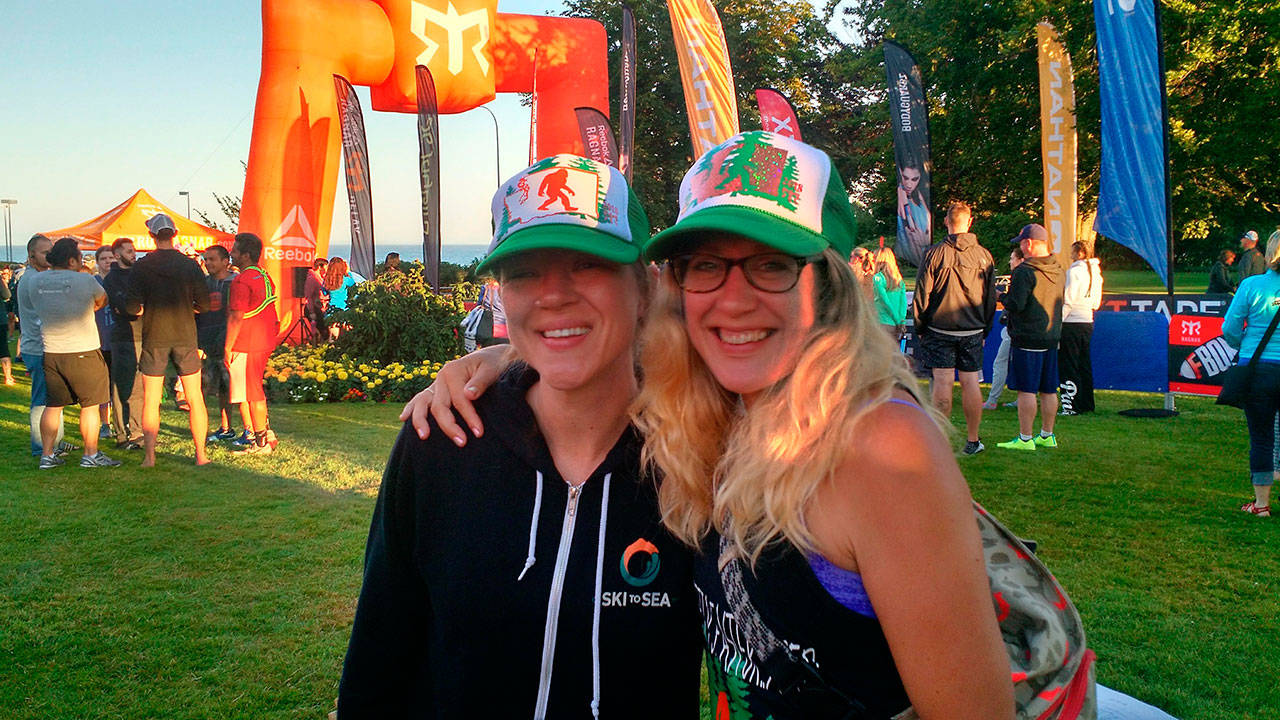The Ragnar fairy sprinkled its magic dust on Megan Benjamin and Rebekah Roberts.
Langley’s Benjamin and Clinton’s Roberts competed in Ragnar’s Northwest Passage earlier this month and, despite the physical and mental toll, are intoxicated by the event.
After running in her first Ragnar relay in 2017, Benjamin said she wouldn’t do it again. However, when 2018 rolled around, she returned to the course —- and she will be back in 2019.
“We already have half our racers for next year’s team,” she said.
Roberts, who competed for the first time this year, said, “The experience was so unique and invigorating, I will definitely attend every year I am able.”
Ragnar sponsors about 20 relays throughout the United States. Every July the circuit comes to Washington for the Northwest Passage, a 200-mile relay from Blaine to Langley.
Most of the relay teams include 12 members, and each runner will complete three legs, covering anywhere from 12 to 20 miles in about 36 hours.
The teams generally split into two units, each riding in a separate van, and leap-frog along the course.
This results in meals of energy bars and chocolate milk and little sleep.
Benjamin and Roberts’ team, which was called “Bigger, Better, Faster…Sorer,” also included runners from Oak Harbor, Shoreline, Bellingham, Ferndale, Fidalgo Island, Seattle and Arizona.
One, Seattle’s Sara Magnusson, grew up on the South End.
The team was formed from the Pacific Northwest Ladies Running Group, which entered five teams in the event.
Benjamin and Roberts’ team had several fill-ins, including three men from Naval Air Station Whidbey who joined at the last minute to complete the team.
So why run Ragnar? Why put up with the physical drain, sweaty vans and lack of sleep?
“There are so many answers to this question depending on who you’re talking to and also their mood while they’re answering,” Benjamin said.
Benjamin, 37, joined last year after receiving an invitation from a friend, “completely unaware of what this relay was all about.”
“I was running a lot when she’d asked me to join, so being very up for an adventure, I accepted,” Benjamin said. “Then another teammate dropped out and my husband joined in as well.”
Roberts, 36, jumped aboard this year after being invited by Benjamin.
“I decided to enter because it gave me a huge goal to work toward,” Roberts said. “Ragnar was unlike anything I had heard of before and I wanted to know if I could do it.”
They were up to the challenge, but it wasn’t easy.
The hardest part, Benjamin said, was “telling myself I could do it when I didn’t want to. This was the hardest thing I’ve ever done, aside from giving birth to two children, but there’s no drugs for this.”
For Roberts, the most difficult part was “being so tired but too excited to sleep.”
The pair said the allure to return each year has as much to do with being part of the team as personal satisfaction.
“Meeting 10 strangers, creating an insta-bond and accomplishing our collective goal was definitely the most rewarding part,” Roberts said. “The feeling you get when strangers are rooting for you to finish your leg of the relay brings such pride to your soul.”
Roberts said one teammate who lived near the opening leg put them up for the night and gave them breakfast at 4 a.m. so she and Benjamin wouldn’t have to drive from South Whidbey to Blaine the morning of the start.
Another teammate offered her Ferndale home for showers during a break in the run.
“The generosity and trust was something unheard of these days,” Roberts said. “The memories and friendships made on this adventure will always be dear to my heart.”
For Benjamin, the race is all about community. First, she noted, are the towns that the relay cuts through where people cheer from their driveways and offer inspiration and refreshments even though the event is clogging their streets with runners and noise.
Then there is the community of all the teams.
“They (runners from other teams) see that you could really use someone to help get you to the finish that is still two miles away, ignoring what their pace time will be by slowing down to help,” Benjamin said.
And, finally, the community of one’s own team.
“Twelve racers per team split between two vehicles willing go sleep-deprived, into the night, to discover what they are made of and demanding that you know what you are made of, while they drive along side you shouting and encouraging you to keep going.”
Benjamin said Magnusson was joined by her father on his bike for the final leg, and he paced her to the finish line at the fairgrounds.
“This, to me, was priceless to witness,” Benjamin said.
Such is Ragnar, as Benjamin and Roberts discovered. It casts a magical spell that entices runners to return each year.
Summing up, Benjamin said, “Relationships are forged, spines are grown and a deep, deep personal acceptance of ‘I can do so much more than I ever thought possible’ happens during Ragnar.”



